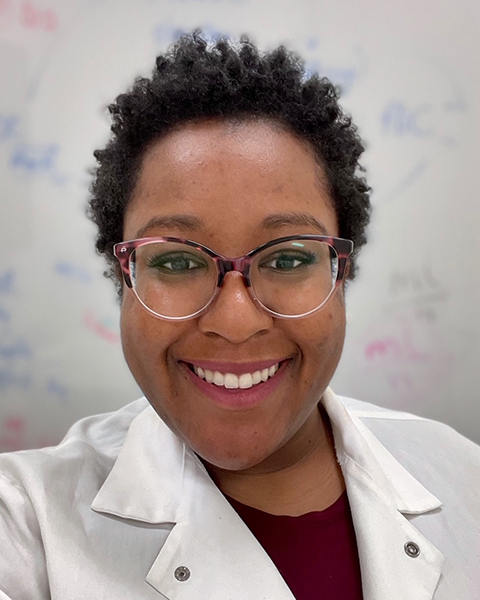#FirstGenDoc #BlackinMicro

Aisha Burton, PhD
Twitter: @Aisha_Burton
Mentor: Dr. Gisela “Gigi” Storz
Area of research: Regulatory roles of small proteins on two component systems in E. coli
A role model is someone whose example inspires others to reach similar successes. When you start out in science, you look up to others for evidence that your goals are achievable. And then as you make progress, others look up to you. Dr. Aisha Burton, recently listed in Cell Mentor ’s list of 1,000 Inspiring Black Scientists in America, is a role model for both female and Black scientists. Read below for Dr. Burton's reaction to the Cell Mentor honor and her personal experiences with community support:
What does it mean to you that Cell Mentor published a list of 1,000 Inspiring Black Scientists in America?
It is an amazing honor, and I am truly humbled to be included on such a star-studded list! It was great to see many of my colleagues on this list! I’m happy that it is bringing awareness that Black scientists do exist in many different fields.
When did you develop your interest in science?
When I was a child, I was very curious about the world around me. My mother used to take me to Sandridge Nature Center (South Holland, IL) as a child, and I would learn about the nature around us (birds, snakes, types of grasses, etc.). I also helped her around the garden and would ask tons of questions. My parents put me in a science camp over summer breaks, and I would always come home excited to tell them what I learned. In high school, my AP chemistry teacher, Mr. Stark, really made chemistry lab fun, and I enjoyed his class. That is when I knew I wanted to pursue a science degree.
As you pursued a scientific career, did you have any role models or mentors who provided a voice of support for your career goals?
I have had a lot of mentors along the way who have helped mold me into the scientist I am today. A few of them are:
- Dr. William Walden at University of Illinois at Chicago gave me my first job as a dishwasher when I was a freshman in college (and he was also the first Black PI I ever met in STEM).
- Dr. Judy Wall was an excellent mentor, and it was in her lab at the University of Missouri where I fell in love with microbiology. She was very encouraging of me to apply to graduate school. I was also a Post-Baccalaureate Research Education Program (PREP) scholar during this time, and the program was very supportive of my goals too!
- Dr. Daniel Kearns was my PhD advisor at Indiana University. He is very supportive of his trainees and the students in the microbiology section. He taught me the importance of taking care of your mental health while on the PhD journey.
- Last, but not least, Dr. Gisela “Gigi” Storz (NICHD) has been a great mentor! As soon as I started as a postdoc, she was interested in my goals and allowed me time to explore. By doing so, I was able to home in on a career in academia at smaller institutions.
As you progress in your career, trainees from underrepresented groups in science will look up to you as a role model. Is there anything you want to tell them?
The journey will be hard, but stay the course. If this degree is what you want, don’t let anyone take you from your goal. Build a community that supports you and wants you to succeed. I was able to succeed by building my own community of family, friends, and mentors.
Check out the NICHD Instagram #Womeninscience series for more of Dr. Aisha Burton's story.
Transcript: “My advice to younger trainees is to build a community. During graduate school, having a community of students and colleagues helped me navigate the highs and lows and was essential for my success.”
— Aisha Burton, Ph.D.
Postdoctoral Researcher, Storz Lab, NICHD
You have a very active Twitter feed! Can you talk about your experience with social media and support for Black scientists?
For me, Twitter is a great place to meet other scientists within and outside of my field. Since I moved from Indiana, I relied on Twitter for support. I have met many of my Twitter followers at conferences or talks. More recently, I have met other Black scientists in my own field.
Recently, there has been a boom of support for Black scientists in numerous fields, and I love it! Being a minority in science brings its challenges (microaggressions, cultural differences, etc.), but having an online community that understands you helps.
Overall, science Twitter is a big melting pot of support for your research and even personal life. It helps remind me that as scientists we are more than just our research.
Any final thoughts to share with the NICHD community about the importance of support for underrepresented groups in science?
Support systems for underrepresented groups in science are very important. It can be the difference between a trainee staying or leaving a program. In my own experience, if I did not have a community supporting me, I might not have finished my PhD. I love that the NIH has the Office of Intramural Training and Education (OITE) because they offer many support groups that help foster communities for trainees.

